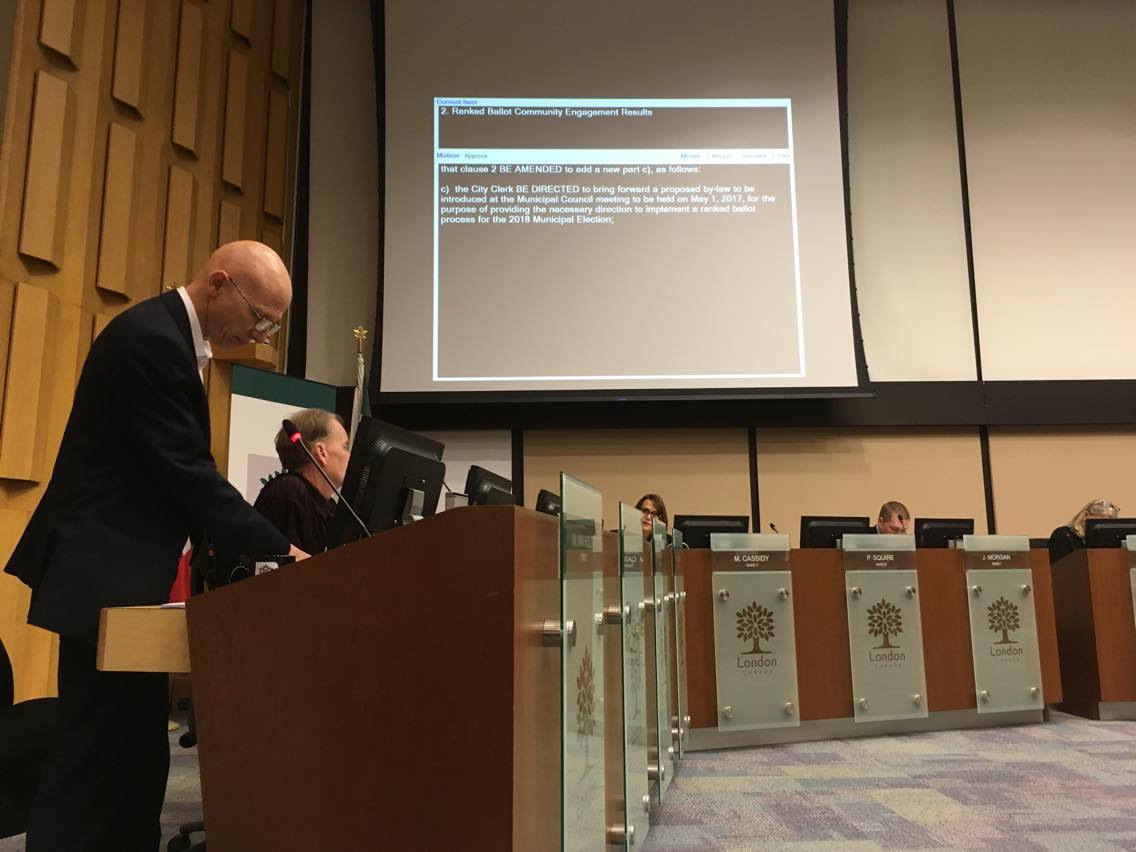London voters will be the first in Canada to pick three candidates for council seats when they cast ballots during next year’s municipal election.

City council voted 9-5 in favour of ranked ballots during a special full council meeting on Monday evening, following roughly two-and-a-half hours of debate revolving largely around the cost associated with the required technology, whether London should lead the country in leaving behind the first-past-the-post system, and if residents would understand a ranked ballot.
“Within 20 seconds, my grandma would know how to vote,” said Counc. Virginia Ridley, relying on what she hailed the “grandmother test” to determine if choosing three candidates instead of one would throw off her constituents.
Counc. Harold Usher however, told his colleagues “it’s a steep learning curve” that could require door-to-door training so residents would know how to vote.
“I’ve yet to hear one of these people say it’s as easy as 1-2-3.”

But Dave Meslin with the group 123 Ontario calls it “incredibly insulting to suggest that any Londoner wouldn’t know how to count to three, or mark one-two-three on a ballot.”

Get breaking National news
Meslin sat on the edge of his seat in a partly-filled gallery during the debate. He said he’s been waiting 11 years for a government to scrap the first-past-the-post voting system.
“This is really exciting. For those of us who have been pushing for voter reform in Canada, we’ve seen disappointing results in BC, in our Ontario process in 2007, this year of course with Justin Trudeau who said he would change the system and he didn’t… It’s really big. Not just for London, but for the whole country.”
The new system could add up to $500,000 in the upcoming municipal election’s $1.9-million budget, and part of the evening’s discussion considered the reliability of vote-counting technology.
“There’s nothing that’s been certified,” pointed out Counc. Michael Van Holst. “I don’t know how I should feel about that.”
Staff explained machines the city uses — and will continue to use — are certified. It’s the algorithm and software that isn’t.
“If we are going to go out to a vendor, and say hey we need a new algorithm to move forward with ranked balloting, I highly doubt they’re going to want to gouge the first municipality coming to the table when they want to make as much money as possible trying to incent other municipalities to take on the same technology,” said Counc. Tanya Park.
In a ranked ballot system, voters rank three candidates on the ballot in order of preference. A candidate must get more than 50-per cent of the vote to win, so if no one achieves half the vote, the candidate with the fewest votes is eliminated and their votes are redistributed according to the next highest choice on those ballots.
The decision came within hours of a provincially mandated deadline. City politicians had until midnight to make a decision on the matter if they wanted to ditch first-past-the-post in time for next year’s municipal election.
Councillors Usher, Armstrong, Squire, Hubert, and Hopkins voted against implementing ranked balloting, while Counc. Salih wasn’t present.












Comments